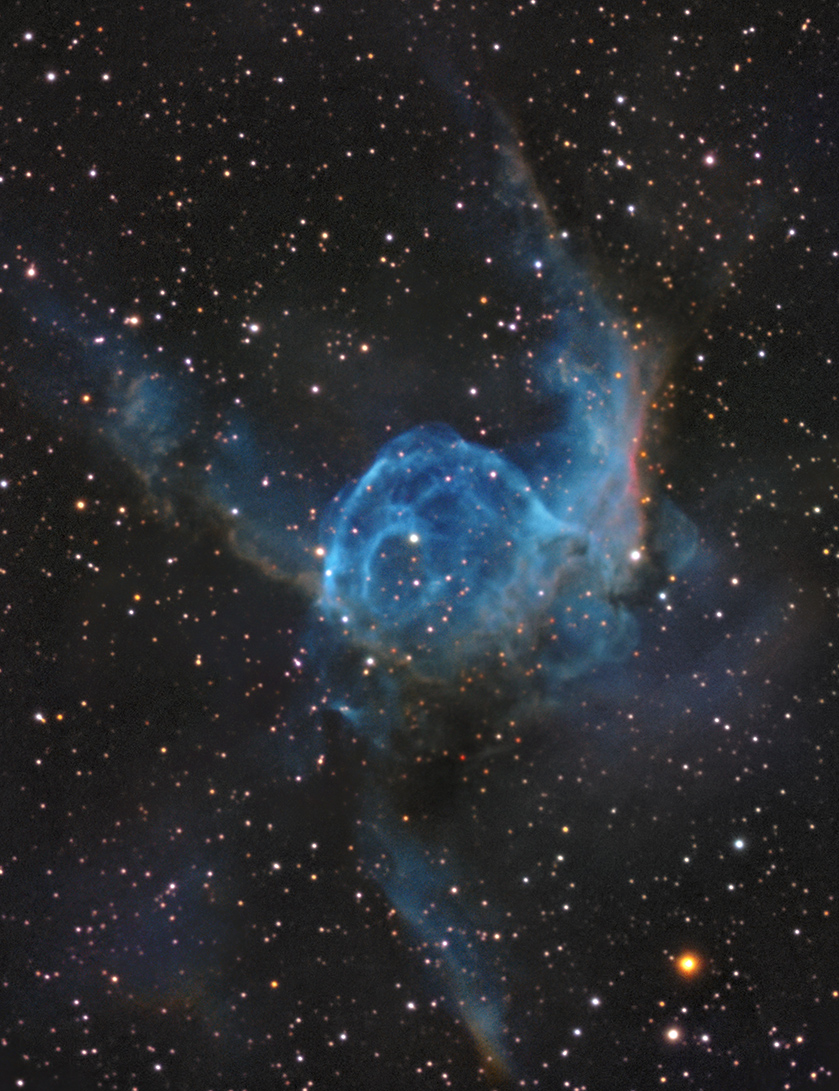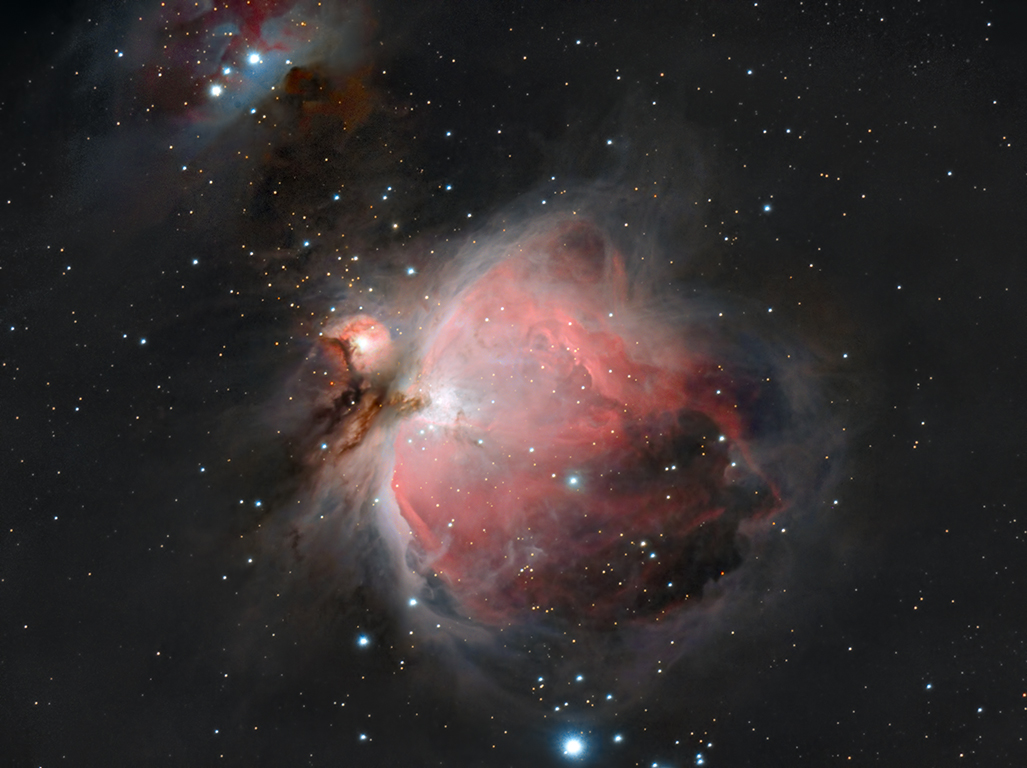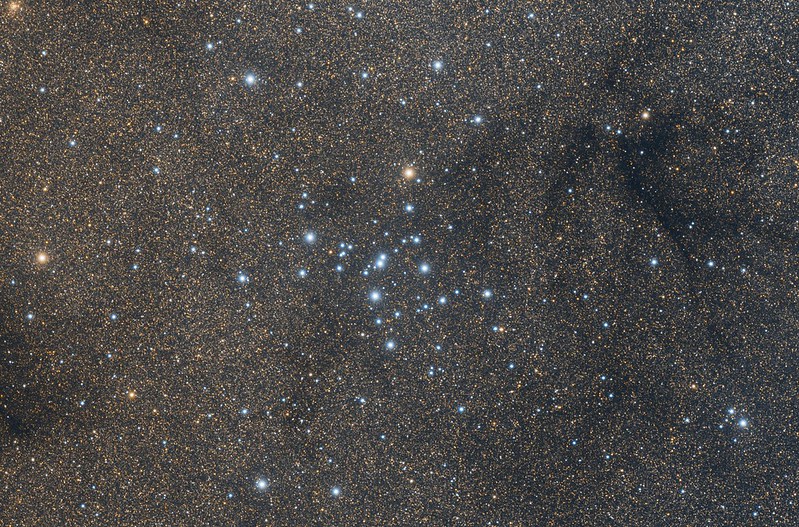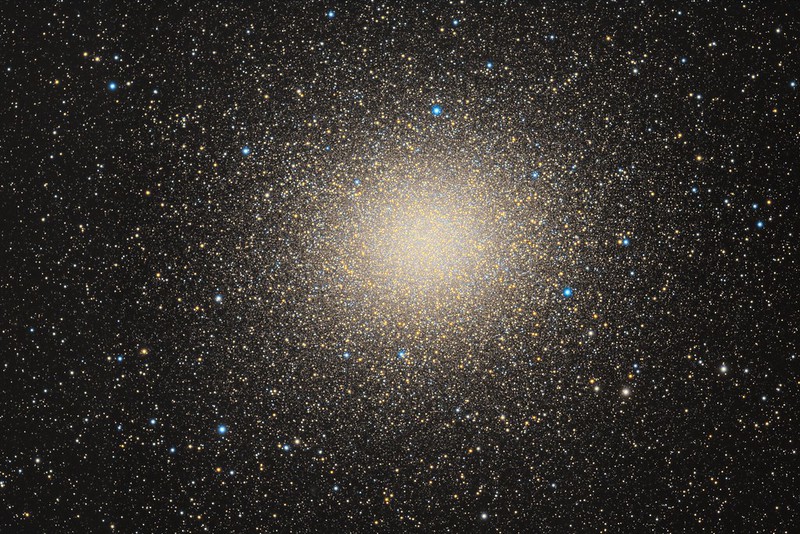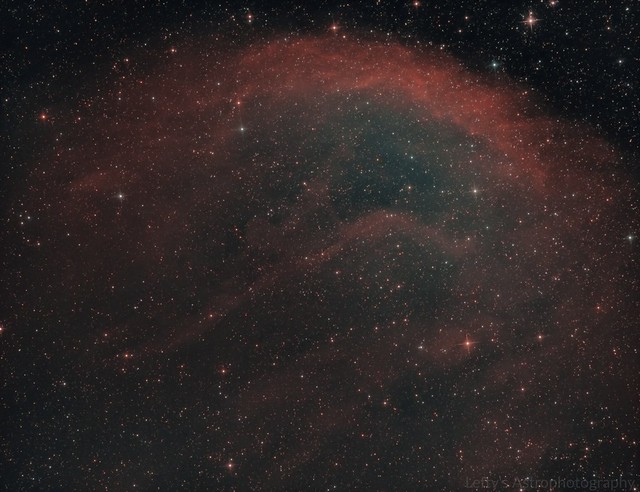Submissions: 2021 February
Re: Submissions: 2021 February
The Orion Nebula - 1,000 Exposures
https://cdn.discordapp.com/attachments/ ... 134/99.jpg
I Spent the last 3 months photographing The Orion Nebula And Running man nebula as much as I could. I really wanted to go all out on this target, and it almost broke me a few times. getting the details in the core and everything else looking the way it should was a lot more of a challenge than I anticipated. But I finally ended up with a result i'm quite proud of, and I hope you all enjoy it!
Equipment:
Telescopes - Sky-watcher 100MM ED APO
Sky-watcher 150MM ED APO
Mount - Sky-Watcher EQ8-RH
Sky-watcher EQR6
Camera - ASI ZWO 6200MM
ASI ZWO 6200MC (Color)
Guide Camera - Lodestar x2
HA - 300s x 100
60s x 200
30sx 200
RGB - 300s x100
150s x200
40s x200
https://cdn.discordapp.com/attachments/ ... 134/99.jpg
I Spent the last 3 months photographing The Orion Nebula And Running man nebula as much as I could. I really wanted to go all out on this target, and it almost broke me a few times. getting the details in the core and everything else looking the way it should was a lot more of a challenge than I anticipated. But I finally ended up with a result i'm quite proud of, and I hope you all enjoy it!
Equipment:
Telescopes - Sky-watcher 100MM ED APO
Sky-watcher 150MM ED APO
Mount - Sky-Watcher EQ8-RH
Sky-watcher EQR6
Camera - ASI ZWO 6200MM
ASI ZWO 6200MC (Color)
Guide Camera - Lodestar x2
HA - 300s x 100
60s x 200
30sx 200
RGB - 300s x100
150s x200
40s x200
Last edited by bystander on Fri Feb 12, 2021 5:35 am, edited 1 time in total.
Reason: Please, no hot links to images > 500KB.
Reason: Please, no hot links to images > 500KB.
-
mdieterich
- Science Officer
- Posts: 100
- Joined: Fri Feb 13, 2015 5:50 pm
Re: Submissions: 2021 February
Zodiacal Light and Milky Way
www.mattdieterich.com
Copyright: Matt Dieterich I find chasing dark skies to be an incredibly fulfilling experience. Standing beneath thousands of visible stars appearing to sit on a blanket of black velvet background sky, those stars feel so close you can reach up and pull them out of the sky! Here's a view of the Milky Way setting with the Zodiacal Light angling off to the left as a column of dust is illuminated by sunlight.
www.mattdieterich.com
Copyright: Matt Dieterich I find chasing dark skies to be an incredibly fulfilling experience. Standing beneath thousands of visible stars appearing to sit on a blanket of black velvet background sky, those stars feel so close you can reach up and pull them out of the sky! Here's a view of the Milky Way setting with the Zodiacal Light angling off to the left as a column of dust is illuminated by sunlight.
-
dominiksito
- Asternaut
- Posts: 2
- Joined: Wed Nov 25, 2020 2:34 pm
Re: Submissions: 2021 February
Pleiades star cluster is one of the most distinct things on the sky since I was a child. I had no idea how much detail is around there!
Equipment:
William Optics RedCat
ZWO Asi 294 MC Pro
ZWO 30mm f/4 Mini Guide Scope
ZWO ASI 120MM-S
EXIF
15x 300s
 pleiady_v3
pleiady_v3
Equipment:
William Optics RedCat
ZWO Asi 294 MC Pro
ZWO 30mm f/4 Mini Guide Scope
ZWO ASI 120MM-S
EXIF
15x 300s
 pleiady_v3
pleiady_v3Re: Submissions: 2021 February
The Wizard Nebula in Cepheus
NGC 7380 is a young open cluster of stars in the northern circumpolar constellation of Cepheus, discovered by Caroline Herschel in 1787. The surrounding emission nebulosity is known colloquially as the Wizard Nebula.
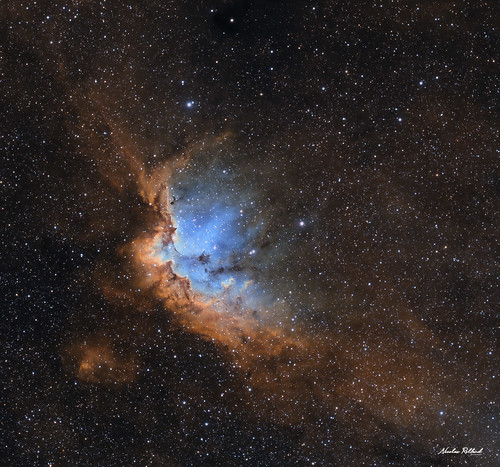
The Wizard Nebula in Cepheus by Nicolas Rolland, sur Flickr
Copyrights
Data acquisition: Terry HANCOCK
Processing: Nicolas ROLLAND
Total acquisition time of 11.6 hours.
Optics: Takahashi 130 FSQ @ F5
Mount: Paramount ME
CCD: QHY600M CMOS
Pre Processing: CCDstack & Pixinsight
Post Processing: Photoshop CC
NGC 7380 is a young open cluster of stars in the northern circumpolar constellation of Cepheus, discovered by Caroline Herschel in 1787. The surrounding emission nebulosity is known colloquially as the Wizard Nebula.

The Wizard Nebula in Cepheus by Nicolas Rolland, sur Flickr
Copyrights
Data acquisition: Terry HANCOCK
Processing: Nicolas ROLLAND
Total acquisition time of 11.6 hours.
Optics: Takahashi 130 FSQ @ F5
Mount: Paramount ME
CCD: QHY600M CMOS
Pre Processing: CCDstack & Pixinsight
Post Processing: Photoshop CC
-
themis85_GR
- Asternaut
- Posts: 7
- Joined: Tue Mar 13, 2012 7:38 am
- Location: Greece
- Contact:
Re: Submissions: 2021 February
Ngc 6888 Crescent Nebula with Soap Bubble guest star!!
Copyright: Karteris Themis
www.astrothemis.gr
More Info here https://tinyurl.com/4lw2auqu
Copyright: Karteris Themis
www.astrothemis.gr
More Info here https://tinyurl.com/4lw2auqu
Re: Submissions: 2021 February
NGC-7822
Best res:
https://a4.pbase.com/o12/58/756058/1/17 ... e_5011.jpg
EQUIPMENT:
APO Astro-Physics 130MM F8.35
ASI 294mm cooled
24 X 600 BIN1 ha
16 X 600 BIN1 OIII
16 X 600 BIN1 SII
GUIDER: STL REMOTE GUIDE HEAD/FMA 180
LOCATION: CERCEDA, MADRID, SPAIN
DATES: DECEMBER 5 , 2020, JANNUARY 16 2021
PROCESSING: FEBRUARY 2 TO 4, 2021
Processing and Capture:
Software: @PIxinsigh, SharpCap
Copyright: Jorge Garcia Martin
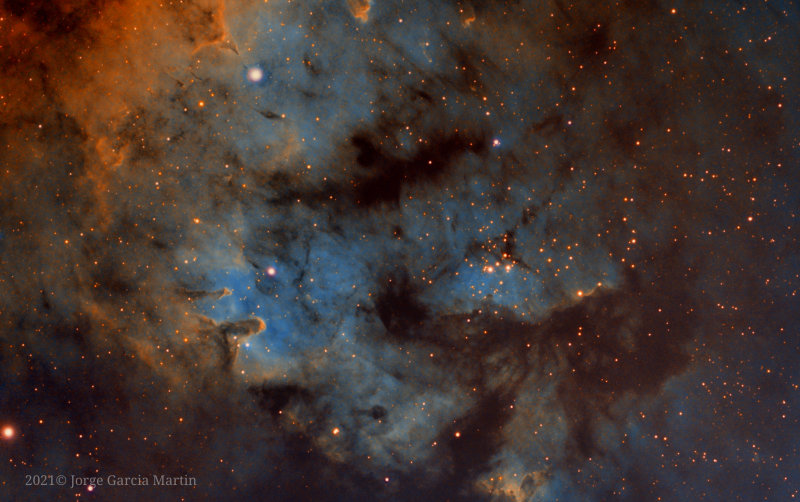
Best res:
https://a4.pbase.com/o12/58/756058/1/17 ... e_5011.jpg
EQUIPMENT:
APO Astro-Physics 130MM F8.35
ASI 294mm cooled
24 X 600 BIN1 ha
16 X 600 BIN1 OIII
16 X 600 BIN1 SII
GUIDER: STL REMOTE GUIDE HEAD/FMA 180
LOCATION: CERCEDA, MADRID, SPAIN
DATES: DECEMBER 5 , 2020, JANNUARY 16 2021
PROCESSING: FEBRUARY 2 TO 4, 2021
Processing and Capture:
Software: @PIxinsigh, SharpCap
Copyright: Jorge Garcia Martin

-
Richardwhitehead
- Ensign
- Posts: 18
- Joined: Thu Feb 11, 2021 4:37 am
Re: Submissions: 2021 February
The Tadpoles Nebula (IC410) and Flaming Star Nebula in the Constellation of Auriga.
I took this HaSHO image last week on a very rare almost clear night. In fact it was the clearest night in northern Vermont since last July!. Rather than completing some earlier projects I thought I’d shoot something entirely new, and go for these subjects as they (almost) fit on the same frame at 620mm focal length..
The Tadpoles Nebula is so called due to the two light colored tadpole shaped dust and gas clouds that look like they are swimming upwards to the center of the nebula. These are star forming regions, similar to the famous “Pillars of creation” imaged by Hubble in the Eagle Nebula.
To get an idea of scale each tadpole is 10 light years long!, more than twice the distance the earth is from its nearest stellar neighbor, Proxima Centauri.
To the left is the Flaming Star nebula ( IC 405) which surrounds the variable star AE Aurigae. AE Aurigae is a “runaway” star ejected from gravitational perturbations in the Orion Nebula more than 2 million years ago.
Its interesting to note that although these two nebulae appear close together the flaming star is 1500 Light years distant, whereas the Tadpoles Nebula is 12,000 lightyears away and over 100 light years across.
This image is processed in the “Hubble Palette where red is aligned with Sulphur emissions, Green with Hydrogen , and Blue with Oxygen .
Tech Data : Celestron RASA 11”, CGX Mount, ZWO ASI 6200MMPro cooled (Mono) camera.
Ha 12 x 5min, OIII 18 x 5 mins, SII 9 x 5 mins, darks, flats, bias frames
Software: Stacked in DSS, Processed in Pixinsight and PS 2021
I took this HaSHO image last week on a very rare almost clear night. In fact it was the clearest night in northern Vermont since last July!. Rather than completing some earlier projects I thought I’d shoot something entirely new, and go for these subjects as they (almost) fit on the same frame at 620mm focal length..
The Tadpoles Nebula is so called due to the two light colored tadpole shaped dust and gas clouds that look like they are swimming upwards to the center of the nebula. These are star forming regions, similar to the famous “Pillars of creation” imaged by Hubble in the Eagle Nebula.
To get an idea of scale each tadpole is 10 light years long!, more than twice the distance the earth is from its nearest stellar neighbor, Proxima Centauri.
To the left is the Flaming Star nebula ( IC 405) which surrounds the variable star AE Aurigae. AE Aurigae is a “runaway” star ejected from gravitational perturbations in the Orion Nebula more than 2 million years ago.
Its interesting to note that although these two nebulae appear close together the flaming star is 1500 Light years distant, whereas the Tadpoles Nebula is 12,000 lightyears away and over 100 light years across.
This image is processed in the “Hubble Palette where red is aligned with Sulphur emissions, Green with Hydrogen , and Blue with Oxygen .
Tech Data : Celestron RASA 11”, CGX Mount, ZWO ASI 6200MMPro cooled (Mono) camera.
Ha 12 x 5min, OIII 18 x 5 mins, SII 9 x 5 mins, darks, flats, bias frames
Software: Stacked in DSS, Processed in Pixinsight and PS 2021
Re: Submissions: 2021 February
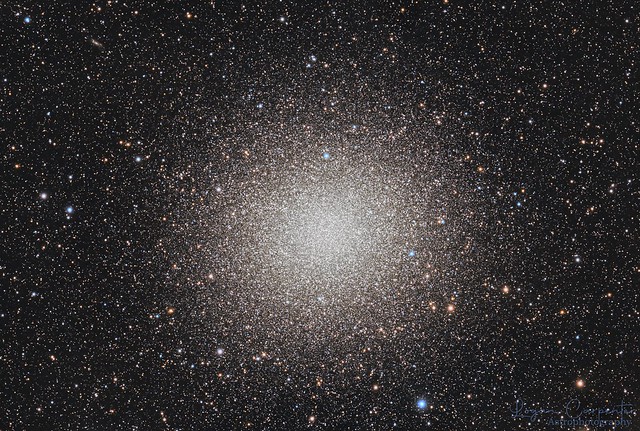 Omega Centauri by Logan Carpenter, on Flickr
Omega Centauri by Logan Carpenter, on FlickrOmega Centauri (NGC5139) is a globular cluster in the constellation of Centaurus, first identified in 1677. At approx 17,000 light yearts from earth, it is the largest known globular cluster in vthe Milky Way and has a diameter of about 150 light years. It is estimated to contain around 10 million. It is thought to be a dwarf galaxy that has been stripped of it's stars although this idea might change as Hubble recently identified multiple small black holes within another globular cluster NGC6397.
Image location: Auckland, New Zealand
Telescope: Skywatcher Esprit 120ED
Camera: ASI294mcPro with Baader Neodymium filter
41 x 3 min exposures for total integration of 2.05hrs
Astrobin link https://www.astrobin.com/22dqhf/?nc=user
Re: Submissions: 2021 February
SH2-308
Click on above for larger image.
Full info @ : https://www.kinchastro.com/sh2-308-dolphin-nebula.html
Click on above for larger image.
Full info @ : https://www.kinchastro.com/sh2-308-dolphin-nebula.html
Re: Submissions: 2021 February
Thors Helmet, a Hubble palette, stars RGB color image, CPH, Denmark
https://www.astrobin.com/users/nvcchr1/
Copyright: Niels Christensen M42, the Orion Nebula, a color image from the light polluted skies in CPH, Denmark
Copyright: Niels Christensen
https://www.astrobin.com/users/nvcchr1/
Copyright: Niels Christensen M42, the Orion Nebula, a color image from the light polluted skies in CPH, Denmark
Copyright: Niels Christensen
Last edited by nvc123 on Mon Feb 15, 2021 4:38 pm, edited 1 time in total.
-
GerminianiMaicon
-
GerminianiMaicon
-
GerminianiMaicon
-
GerminianiMaicon
-
GerminianiMaicon
-
GerminianiMaicon
-
Richardwhitehead
- Ensign
- Posts: 18
- Joined: Thu Feb 11, 2021 4:37 am
Re: Submissions: 2021 February
M42 and Running man Nebula
Imaged in Jan 2021 in Northern Vermont, USA
A blend of 3 sets of exposures at 10 min, 2 min and 30seconds to go from dust lanes to core.
Equipment:
RASA 11". CGX mount, ASI 6200 MC pro
Processd in Pixinsight and Photoshop.
Imaged in Jan 2021 in Northern Vermont, USA
A blend of 3 sets of exposures at 10 min, 2 min and 30seconds to go from dust lanes to core.
Equipment:
RASA 11". CGX mount, ASI 6200 MC pro
Processd in Pixinsight and Photoshop.
-
thomasroell
- Ensign
- Posts: 28
- Joined: Tue Oct 27, 2020 7:23 pm
Re: Submissions: 2021 February
It's an image of the Heart Nebula together with the Soul Nebula, taken with my DSLR from my home in The Netherlands.
I hope you like it!
RGB90 x 600 sec ISO 3200
Total exposure time 7 hours and 30 minutes
🖥 Edited in AstroPixel Processor, Starnet++, Photoshop and Lightroom
.
 Sky-watcher HEQ5, Sharpstar 61EDPH Triplet APO, Svbony 60 mm guidescope with a ZWO ASI120MM guidecamera.
Sky-watcher HEQ5, Sharpstar 61EDPH Triplet APO, Svbony 60 mm guidescope with a ZWO ASI120MM guidecamera.
🕹ZWO ASIAIR
 astromodified Canon EOS6D, Optolong L-Extreme filter
astromodified Canon EOS6D, Optolong L-Extreme filter
Thomas Röell
Instagram: @pilot_astro
I hope you like it!
RGB90 x 600 sec ISO 3200
Total exposure time 7 hours and 30 minutes
🖥 Edited in AstroPixel Processor, Starnet++, Photoshop and Lightroom
.
🕹ZWO ASIAIR
Thomas Röell
Instagram: @pilot_astro
-
goodastronomy
- Ensign
- Posts: 24
- Joined: Wed Sep 19, 2018 11:47 am
Re: Submissions: 2021 February
Happy to present my recent images from Winter 2020/21. These are from our dual remote systems in Fort Davis, Texas consisting of:
Primary - Planewave 14" CDK/Paramount ME2/FLI PL16803 with Chroma filters
Secondary - Stellarvue 130/Paramount Mx+/ASI533MC (also on this setup is a SV70/SX 694 Trius; Askar ACL200/Canon 6d full spectrum).
First off, a 4 panel mosaic of Cederblad 51 in Orion, total exposure of L/OSC of 42.7 hours:
Next is NGC 660 in Pisces, total exposure of L/OSC of 25.7 hours:
Then we went to the Angel in Monoceros, NGC 2170. L/OSC of 22.5 hours: All images copyright Casey Good/Steve Timmons
Primary - Planewave 14" CDK/Paramount ME2/FLI PL16803 with Chroma filters
Secondary - Stellarvue 130/Paramount Mx+/ASI533MC (also on this setup is a SV70/SX 694 Trius; Askar ACL200/Canon 6d full spectrum).
First off, a 4 panel mosaic of Cederblad 51 in Orion, total exposure of L/OSC of 42.7 hours:
Next is NGC 660 in Pisces, total exposure of L/OSC of 25.7 hours:
Then we went to the Angel in Monoceros, NGC 2170. L/OSC of 22.5 hours: All images copyright Casey Good/Steve Timmons
Last edited by goodastronomy on Tue Feb 16, 2021 12:43 am, edited 1 time in total.
-
goodastronomy
- Ensign
- Posts: 24
- Joined: Wed Sep 19, 2018 11:47 am
Re: Submissions: 2021 February
And a few more:
A 2 panel mosaic of M33. Total exposure time of 34.2 hours:
Messier 78 in Orion, which my wife likes to refer to as a "Cosmic Waterfall":
And finally, NGC 247 in Cetus:
All images copyright Casey Good/Steve Timmons
A 2 panel mosaic of M33. Total exposure time of 34.2 hours:
Messier 78 in Orion, which my wife likes to refer to as a "Cosmic Waterfall":
And finally, NGC 247 in Cetus:
All images copyright Casey Good/Steve Timmons
- carlos uriarte
- Ensign
- Posts: 38
- Joined: Sun Oct 13, 2019 6:17 pm
Re: Submissions: 2021 February
Hi friends!
Very different from the ones I usually see from M78.
This image contains Hydrogen Halpha, in the molecular field of Orion. M78 is a reflection nebula and therefore no broadband signal appears. So I wanted to show both parts. Halpha and LRGB
It has been a very hard process and a total of 17h of integration
Equipment:
Takahashi FSQ106 f5
Atik 460EXm
Paramount ME
Software:
SGPro4, TheSkyX, Pixnsight, Photoshop
Image Details:
L: 20x600
RGB: 40x300 each channel
Ha: 15x900
Total exposure time: 17h
January and February 21 from Àger. Catalonia, Spain.
 Messier 78 by Carlos Uriarte, en Flickr
Messier 78 by Carlos Uriarte, en Flickr
Very different from the ones I usually see from M78.
This image contains Hydrogen Halpha, in the molecular field of Orion. M78 is a reflection nebula and therefore no broadband signal appears. So I wanted to show both parts. Halpha and LRGB
It has been a very hard process and a total of 17h of integration
Equipment:
Takahashi FSQ106 f5
Atik 460EXm
Paramount ME
Software:
SGPro4, TheSkyX, Pixnsight, Photoshop
Image Details:
L: 20x600
RGB: 40x300 each channel
Ha: 15x900
Total exposure time: 17h
January and February 21 from Àger. Catalonia, Spain.
 Messier 78 by Carlos Uriarte, en Flickr
Messier 78 by Carlos Uriarte, en Flickr-
DustSpeakers
- Asternaut
- Posts: 8
- Joined: Tue Oct 20, 2020 10:35 am
NGC 2264 - Cone Nebula and Christmas Tree Cluster
 NGC_2264-ChritsmasTreeClusterAndConeNebula by Steve F, on Flickr
NGC_2264-ChritsmasTreeClusterAndConeNebula by Steve F, on FlickrA bit late for the Christmas season but...
...the Cone Nebula and Christmas Tree Cluster are about 2,600 light years away in the constellation of Monoceros.
Taken over 2 nights (Feb 10 and Feb 12 2021) from Bortle 5 back garden in UK with Ha narrowband for the first night and RGB filters for the second night.
All imaging done with just an Ioptron Skyguider Pro with no guiding and Redcat 51 / ASI 1600MM
- Ha 60 x 120s
- R 27 x 120s
- G 27 x 120s
- B 30 x 120s
- 30 each of Bias, Drks and Flats
Processed in APP, StarTools and Gimp.
-
Lefty's Astrophotography
- Ensign
- Posts: 21
- Joined: Mon Mar 16, 2020 12:32 am
Re: Submissions: 2021 February
My photo of the largest planetary nebula: Sh2-216
This is 60 hours of narrowband exposure from my Bortle 6 driveway. Captured using a 6" f/4 newtonian, ASI1600, and Astrodon filters on an Orion Sirius mount.
Direct link to the full size image: https://live.staticflickr.com/65535/508 ... ab20_o.png
Full acquisition/processing details can be found here: https://www.flickr.com/photos/leftysast ... 875743982/
This is 60 hours of narrowband exposure from my Bortle 6 driveway. Captured using a 6" f/4 newtonian, ASI1600, and Astrodon filters on an Orion Sirius mount.
Direct link to the full size image: https://live.staticflickr.com/65535/508 ... ab20_o.png
Full acquisition/processing details can be found here: https://www.flickr.com/photos/leftysast ... 875743982/
Re: Submissions: 2021 February
One of the dozens of red sprites that I managed to record on the night of February 1, 2021, that occurred above the thunderstorms in the Aegean Sea between the Greek Island of Chios and Turkey. The recording took place west of the storm and at a distance of 200km away.
Red sprite is classified as TLEs (Transient Luminous Event) and is a very rare atmospheric phenomenon that is directly associated with positive CG's in (usually) highly active storm clusters.
Red sprite is classified as TLEs (Transient Luminous Event) and is a very rare atmospheric phenomenon that is directly associated with positive CG's in (usually) highly active storm clusters.


